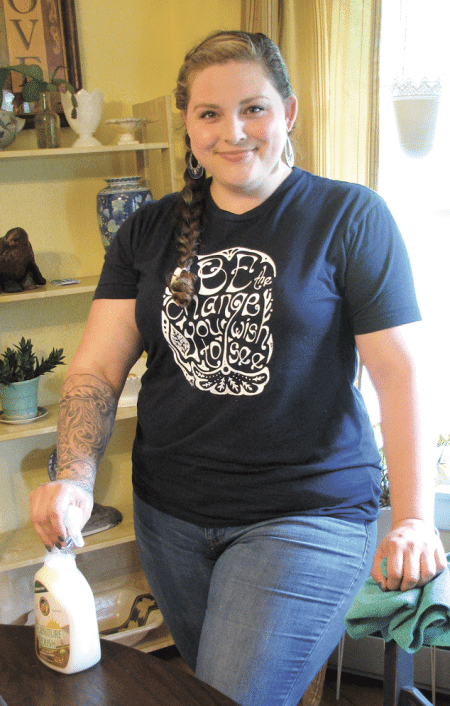
Beloved Earth Builds on Its Founder’s Innovative Idea
Clean and Green
Terra Missildine has always had a passion for sustainable living, and after learning, a decade ago, about the health issues some people have with harsh chemical cleaners, she and her husband, David, launched a ‘green’ cleaning company that uses only products that are safe for people and the environment. Ten years later, that startup, Beloved Earth, has significantly grown its clientele and employee roster. Meanwhile, she’s turned her focus to another type of sustainable living — the challenge of raising young children while running a business — and has some ideas to help parents balance both.
Terra Missildine says she had a passion for sustainable living long before she heard that phrase or knew what it meant.
“I had a nature-based childhood,” she told BusinessWest. “My dad and mom had a family campground in upstate New Hampshire — completely off the grid, no running water. It was an old trapping cabin from the early 1900s with an outhouse and gravity-fed plumbing; we had to hike down and grab spring water to fill the tank.
“I had a lot of respect and admiration for my parents, and I was always interested in natural ways of things,” she went on, adding that she and her father later launched a project raising heritage breed sheep. “It occurred to me, as I became more and more interested in healthy and humane care of animals, why shouldn’t I be just as concerned about people?”
That question led her, a decade ago, to study sustainable living at UMass Amherst, where she learned about the chemical sensitivity and allergies many people have to harsh household cleaning products, which can cause them severe health reactions. So she and her newlywed husband, David — who had experience with a cleaning company — had an entrepreneurial idea. And that’s how Northampton-based Beloved Earth began in 2005.
“We’d only been married a couple of months, and we were looking for something we could do together,” Missildine explained. “We combined his experience with my passion for sustainable living — and the creating organic movement in the area — and launched the first ‘green’ cleaning company in Western Massachusetts; the only other one in the state at the time was in Cambridge.”
Unfortunately, at the time, there were few commercial products available for people who suffer from such sensitivities, and the ones that did exist were prohibitively expensive. So the couple made their own from items like lemon oil, vinegar, Borax, and baking soda.
“They work, but they often take a lot of elbow grease,” she laughed. “We were coming in with alternatives that didn’t exist yet in the beginning. Really, the green aspect of our business was a value-added service to people who just needed cleaning. We were competitive pricewise, very friendly, and passionate about what we were offering. In the beginning, part of our job was to educate people as to why green was better.”
Customers liked what they heard, and Beloved Earth took off — first mostly in homes, but soon in the commercial arena as well, which now accounts for about 60% of the company’s clientele –— and grew to 12 employees and counting.
“We didn’t even have competition in green cleaning until 2008, maybe 2009,” Missildine said, noting that others have since jumped on the trend. “I love the idea of tons of competition in this area; it means everyone is making better choices, and all boats rise with it. I would rather all companies were choosing green practices.”
Indeed, she noted, “there are a lot of great, efficient, green cleaning products now,” to complement the ones she makes. “Really, there’s no reason to use conventional, toxic alternatives.”
And while businesses need to employ professional cleaning services, plenty of families appreciate what Beloved Earth brings to their home as well. “As people get busier, their families are growing, they may be working two jobs, it’s difficult to keep up with things like housework,” she added. “It’s easier to delegate household tasks and free up time for other things you’re better at or feel more passionate about.”
It’s clear where Missildine’s passion lies — and she’s turning it into a noteworthy success story in the Valley.
Sustaining Success
Missildine likes to break that passion for sustainability down to three Ps, what she calls here “triple bottom line”: People, planet, and profit.
 Obviously, being exclusively a green, sustainable cleaning company, we only choose things that are good for the planet — organic, not chemically fragranced — and we also choose to back companies with our purchasing dollars which make better choices for the environment and have a commitment to sustainability, rather than purchase the ‘green’ line of products from Clorox,” she explained. “So we purchase from companies like Shaklee or Seventh Generation, which have committed to the environment and aren’t just capitalizing on the wave of sustainability.”
Obviously, being exclusively a green, sustainable cleaning company, we only choose things that are good for the planet — organic, not chemically fragranced — and we also choose to back companies with our purchasing dollars which make better choices for the environment and have a commitment to sustainability, rather than purchase the ‘green’ line of products from Clorox,” she explained. “So we purchase from companies like Shaklee or Seventh Generation, which have committed to the environment and aren’t just capitalizing on the wave of sustainability.”
But her belief in sustainable living extends far beyond cleaning supplies.
“We really try to practice it at the bottom line,” she said, noting that Beloved Earth pays its workers 30% to 50% higher than the industry norm. “Our employees are not disposable commodities for us. We compensate them very well. We value them and recognize them. We don’t necessarily compete on price in order to be sustainable in other ways. We need to make money and compete on quality, and the people coming into homes and businesses are happy, loyal, well-paid, and well taken care of. That’s one of our core values.”
The company hasn’t gone out of its way to market that fact, she went on, stressing that the green aspect of Beloved Earth is really its calling card and strength when it comes to search-engine presence. “We don’t do it as a marketing tool. But as customers have conversations with our staff, find out they make very good wages, they feel like they’re respected and taken care of, and it’s definitely a loyalty-building piece of information.”
But growing a staff for the long term has been an often-challenging process.
“Because we like to have super-high-quality, loyal, long-term staff, it’s harder to fill those positions than for some of my competitors who just consider it a cost of doing business to have high employee turnover; they pay minimum wage, expect three to six months from each employee, and constantly funnel them in and out,” Missildine said.
“We are the opposite model; we really want to incentivize and attract people to be with us long-term. One of our challenges is keeping our staffing on pace with the demand for our services. I do employ a professional business strategist to help figure this out, and we have a waiting list of clients who want to work with us. We’re getting there as we staff up and train the right people to match up with them.”
Still, she considers herself fortunate to have become a regional innovator in green cleaning at the right time, just as awareness of green cleaning began to pick up.
“We came in at the perfect time,” she said. “It was a very quickly growing movement, and we started having enough client support to spend more capital on products, which were very expensive; now there are a lot of other, more affordable products. We did ride the wave of the green movement; it was very good timing, with awareness of green living in general just skyrocketing, and products to help people make those choices becoming more readily available.”
Bring the Kids
In short, things were humming along smoothly for Missildine and her husband, as they were able to pour all their time and energy into this entrepreneurial venture.
But then, last year, baby made three. And the birth of their daughter got Missildine thinking about another aspect of sustainable living — specifically, how to balance a successful business with equally successful parenting.
To that end, she has been working with SPARK, the Holyoke-based economic-development organization, to create a co-working space in that city with integrated child care, so that startup entrepreneurs, remote workers, and others in need of a workspace could share space, resources, and brainpower — and bring their preschoolers along, to a day-care center staffed by an early-childhood specialist.
Click here to download a PDF chart of Area Resources for Entrepreneurs
“I have a toddler myself, 18 months old, but before that, I was a full-time, driven entrepreneur, and that side of you never shuts off,” she told BusinessWest. “I was available 24 hours a day for the business before starting a family and trying to become the mother I want to be and, with my husband, the couple we want to be.
“So I took on the challenge of creating a space with shared resources and collaboration with other people in the similar stage of life, a place you could bring your child and get uninterrupted work time,” she went on. “Paying for full-time child care is very cost-prohibitive for a lot of workers. Even worse, some people feel like they can’t work out of their homes, so they have to pay for child care and pay for a professional work space. Hopefully, this will mitigate that for a lot of people with kids. They’ll have a lot more amenities, a lot more resources, and also be able to cross-collaborate with other professionals.”
Many details are still being discussed, including where the space would be located, and whether to package the child-care component and collaborate with an existing co-working space in the area or launch a new entity. What it won’t be, Missildine emphasized, is a padded room where kids are dumped off to play safely but mindlessly. Rather, it will be a creative, enriching, curriculum-driven program “so your child can feel just as good about you going to work as you do. And during your downtime, after getting your work done, you can actually spend lunch with your baby.
“I’m committed by the end of the year to having something available for these folks,” she added. “I know I don’t want to be away from my daughter all day; I want pockets of time to be super productive, but other times, I want to be there. My baby will only be my baby for a short time. The driving force behind this is, I don’t think it’s acceptable to make people choose between having a thriving business and having a happy family life. You shouldn’t have to choose one or the other. This is an epidemically underserved portion of life that no one is thinking about.”
Beloved Idea
Until her co-working plan comes to fruition, Missildine will have to be content with growing a successful business that began with a simple idea and a lot of passion — the type of story, in other words, that is becoming much more common across the Pioneer Valley’s burgeoning entrepreneurial culture.
And, in a region rife with resources for entrepreneurs, assisting with everything from funding to staffing to training, she encourages others to do the same.
“My words of advice are to go with the flow, go with where your inspiration is, and remember, you don’t have to quit your day job to start something new,” she said. “If you have a decent job that can pay the bills while try something new on the side, then you can test the water without all the risk, without jumping in all or nothing.
“Entrepreneurship is very rarely easy,” she added. “The times you see someone’s meteoric rise and have no idea how it happened, there was usually a lot of personal sacrifice to get to that, quote-unquote, ‘overnight success’ — a lot of blood, sweat, and tears.”
And, sometimes, a lot of non-toxic cleaning supplies.
Joseph Bednar can be reached at [email protected]






